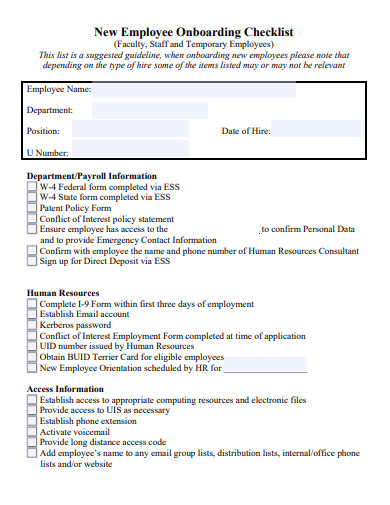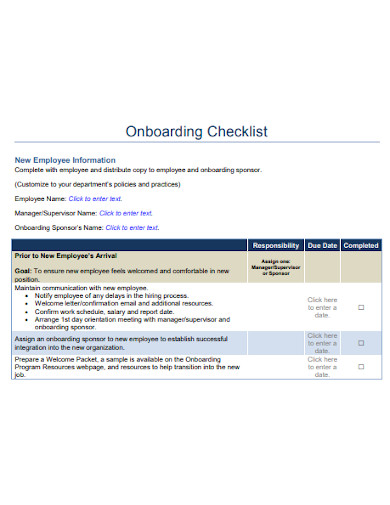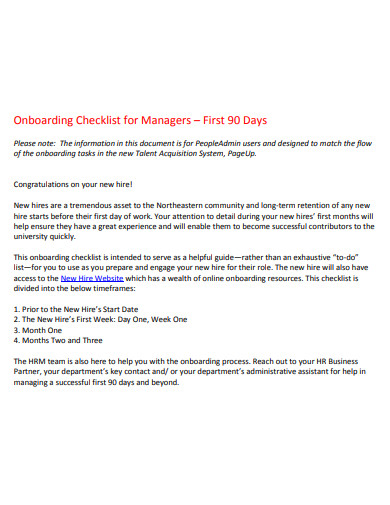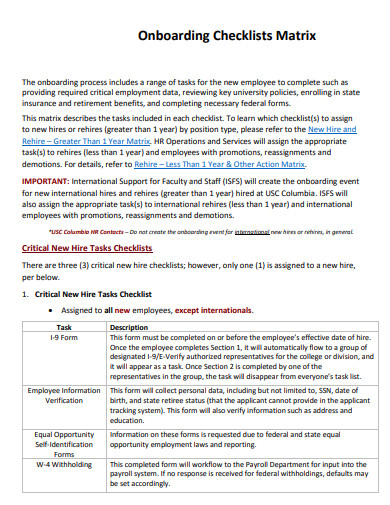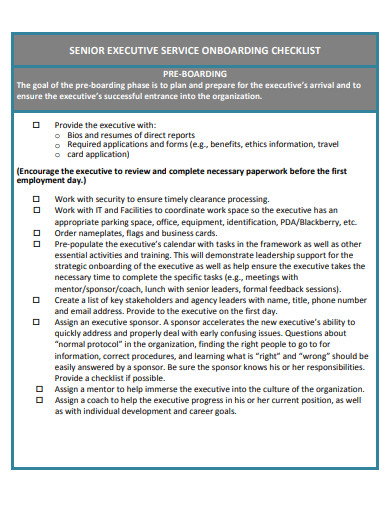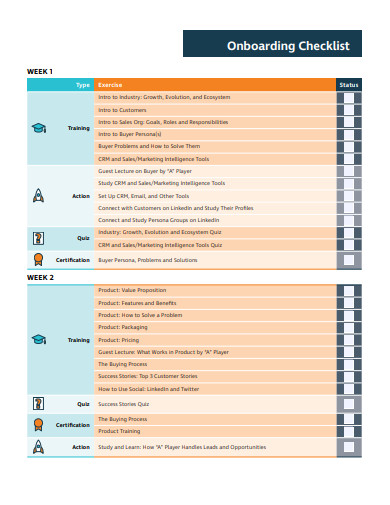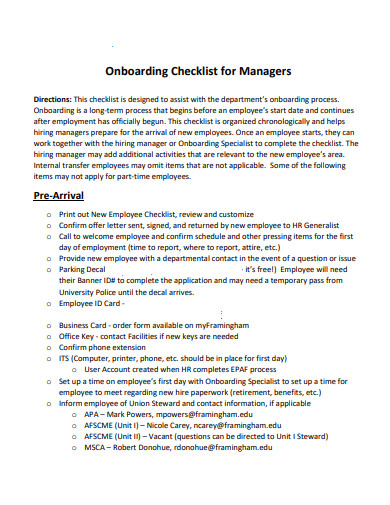16+ Onboarding Checklist Examples to Download
As part of the human resources department’s recruitment or onboarding plan process, new hires or new staff are welcomed with an orientation on their first day. In preparation for this, the HR personnel is obliged to create a document that illustrates and enumerates their given tasks. This document could be a work timeline, checklist, or other paperwork that acts as an outline or a guide for the successful implementation of their work. If your HR team is currently engaged in hiring new employees, then make their work hassle-free by providing them a ready-made onboarding checklist! You can also make one from scratch through the help of our insights, guidelines, and examples below!
16+ Onboarding Checklist Examples
1. Restaurant Employee Onboarding Checklist
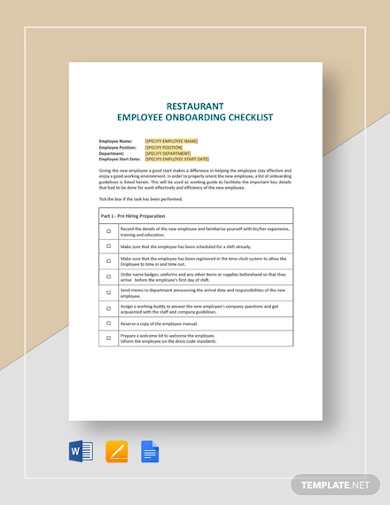
2. Onboarding Checklist Example
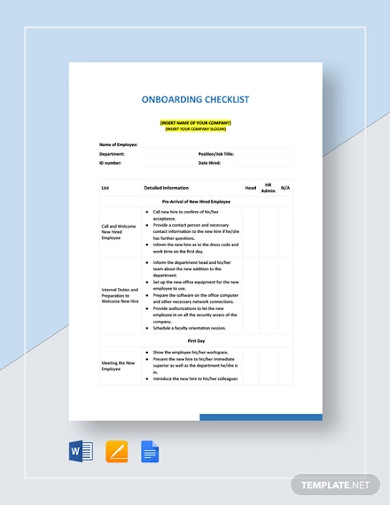
3. New Employee Onboarding Checklist
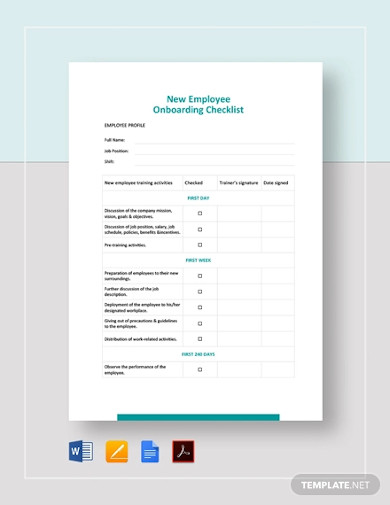
4. Employee Onboarding Checklist
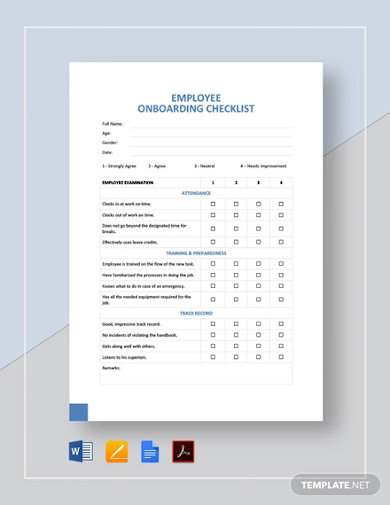
5. Developer Onboarding Checklist
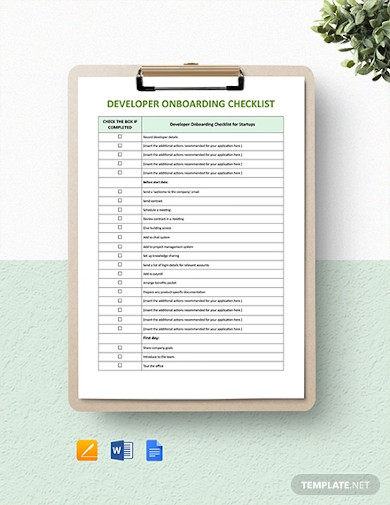
6. IT Onboarding Checklist
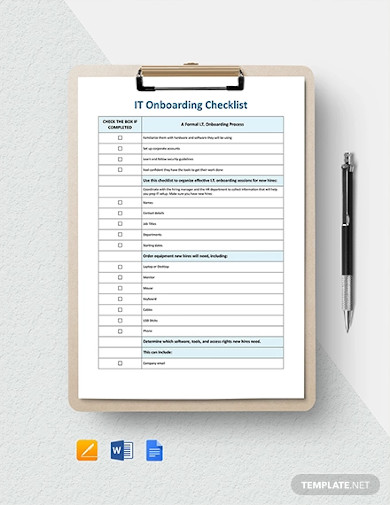
7. HR Onboarding Checklist
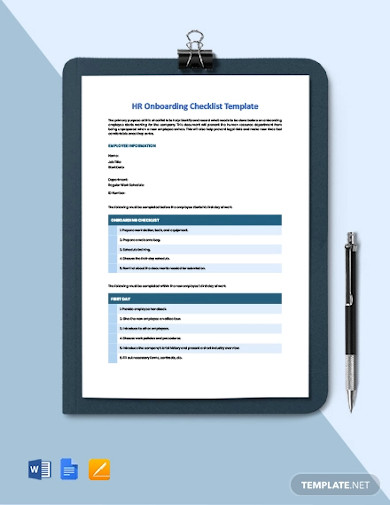
8. Sample Onboarding Checklist Example
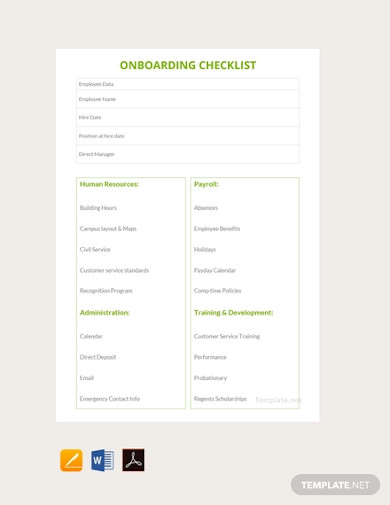
9. HR New Employee Onboarding Checklist
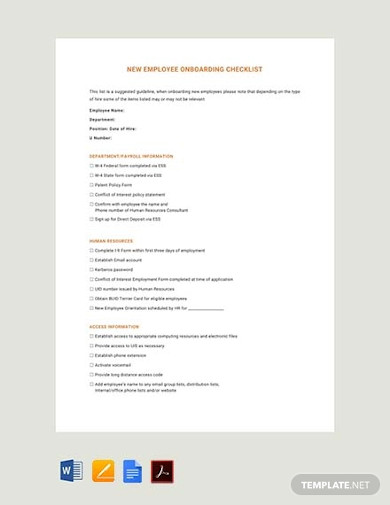
10. Project Onboarding Checklist
11. Engineering Onboarding Checklist
12. Onboarding Checklist for Managers
13. Supervisor Onboarding Checklist
14. Senior Executive Service Onboarding Checklist
15. Sales Onboarding Checklist
16. Sample Onboarding Checklist for Managers
What Is an Onboarding Checklist?
An onboarding checklist is a document that helps a company’s onboarding team sort out the onboarding process while ensuring its requirements and schedule. Corey Kime wrote in his 2014 article for Lessonly that having one is highly beneficial in three ways. For starters, it saves the onboarding team ample time in conducting the said process because it already outlines everything that needs to be done in order. Second, the onboarding team will be consistent with their activities for every new hire, making the process fair for the tenured employees. Lastly, the recruitment checklist makes the transition experience of the new staff smooth through the help of the document’s outline.
The Phases of Employment Experience
Almost all of us have experienced or still experiencing what it’s like to be an employee. During this episode of our lives, we underwent both ordeals and uplifting moments. Whichever kind of experience dominates in each of us, we can all agree that the phases we’ve gone through in employment, in general, are the same. Let’s take a moment to understand them better.
1. Onboarding – We got accepted by an employer, introduced to its working environment, and welcomed as another member of a corporate entity.
2. Preliminary Development – Employers acquaint us with the company procedure, operations, equipment, and our responsibilities.
3. Continuous Development and Retention – Various training programs are enforced on us to improve our skills and knowledge for their benefit and ours.
4. Dissociation – By force or by choice, we cut off our connection with, now, our former employer for some reason.
How To Create an Onboarding Checklist
Onboarding is one good way to see fresh faces in your workplace. This could also mean that you get to add another contact in your list of professional connections and to potentially improve your organization as a whole. With those taken into account, it is important to make a good impression on new hires. This is why we have set our list of steps on how to create an onboarding checklist to make sure you give the newbies good onboarding experiences. Here’s how.
1. Submit Job Requisition
A job requisition is a document that many executives use to request the acceptance of a job candidate to fill a specific role. It can also take the form of a request for approval letter. Once submitted, the HR may have to conduct a training needs analysis to the selected candidate.
2. Prepare Necessary Documents
Contracts, agreements, and job summaries are some of the legal documents that need to be prepared in advance for the new hire. These items will serve as his or her references whenever work-related questions come to mind.
3. Purchase Tools
Make sure to send out the purchase order for the new hire’s devices and equipment weeks or months before he or she will start. These tools are important to fulfill his or her responsibilities.
4. Create Database Accounts
Upon the arrival of the new hire, his or her access to your company’s software inventory and data inventory must be readily available. Just like the devices and equipment, accounts on the database are compulsory for all employees in completing their assigned tasks.
5. Arrange Workspace
A good way to welcome new hires is to present to them a clean workspace that’s ready for any hustle and bustle. Aside from setting up the workspace, your team should also check if the devices and equipment are fully functional to avoid delays in your activities.
6. Schedule Orientation
Include in your onboarding agenda the orientation of the new hires. It is during this time of the schedule that they learn about your organization’s culture, policies, and procedures. The signing of the paperwork also falls during this time.
7. Organize a Workplace Tour
Showcase how comfortable your organization’s location is for a workplace. While touring the new hires, identify which department occupies each room and briefly discuss its general function.
8. Announce the News
The tenured employees and new hires will surely be delighted with the employment news. So, it would be great to announce them to both of them. Doing so will allow the former employees to prepare for a warm welcome to the latter.
9. Check Up on the New Hire
The whole onboarding process will take at least six months to be completed. Right from the first week after their employment, you should check up on the new hires and inquire how they’re holding up. Apart from building rapport, doing so also defines issues that need to be addressed.
FAQs:
What are the types of on-boarding?
There are five types of on-boarding. They include operational, knowledge, performance, social, and talent.
Does onboarding have another term and definition?
Onboarding can also be referred to as organizational socialization. It can be defined as the process of new employees’ acquisition of skills and knowledge, as well as the shaping up of professional behavior.
How do mentors help new employees?
Mentors offer guidance and advice to new employees during their first six months. Through this superintendence, the new employees will experience professional development until they are ready to operate independently.
Onboarding and checklists are two completely different things. The former is a process, and the latter is a document. Despite the difference, the two have been considered as important elements in handling employer-employee relationships. In fact, Christine Marino stated in her article for Click Boarding LLC that onboarding programs revamp employee retention by 25%. At the same time, they also refine employee performance by 11%. If you integrate the benefit of checklists to the processes, success is guaranteed.



